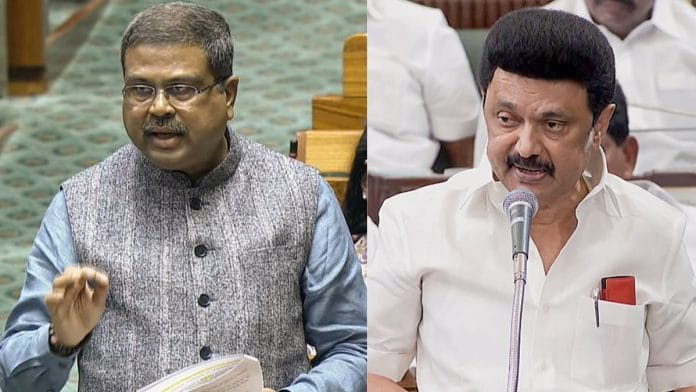Chennai: Only two languages, Tamil and English—that’s the upshot of the Tamil Nadu State Education policy released on Friday. It reaffirms the state’s commitment to its two language policy and abolishes public examination for Class 3, 5 and 8, defying the National Education Policy.
Asserting Tamil Nadu’s educational autonomy, Chief Minister M.K. Stalin released the Tamil Nadu State Education Policy (SEP) 2025 at the Anna Centenary Library Auditorium in Kotturpuram in Chennai Friday.
Speaking at the event, Chief Minister M.K. Stalin said he wanted every student to complete school education and pursue higher education under the Dravidian model of governance.
“Our mother tongue Tamil will remain our pride and identity. Most importantly, our firm policy is the two-language policy—Tamil and English. Let me reiterate: the two-language policy is our resolute stance!,” Stalin said.
The SEP 2025 comes amid a heated dispute over the Union Government withholding Rs 2,291 crore under the Samagra Shiksha Abhiyan scheme because Tamil Nadu refused to adopt NEP 2020. The State has filed a petition before the Supreme Court, arguing that linking funds to NEP implementation is “unconstitutional”.
The Tamil Nadu State Education policy, crafted by a 14-member committee led by retired High Court Judge Justice D. Murugesan, positions itself as a direct counter to the Centre’s National Education Policy (NEP) 2020, emphasising inclusivity, social justice, and Tamil Nadu’s cultural heritage.
The SEP 2025 is described as a “child-centric, inclusive, and future-ready” blueprint. The policy also recommended banning advertisements for NEET coaching centres, reflecting the state’s strong opposition to NEET, which the ruling DMK has labeled “anti-social justice”.
“Do you know how many government school students who passed Plus-2 this year have enrolled in higher education? A remarkable 75%! I expect this number to increase even further next year, surpassing this achievement,” CM Stalin said, adding that the goal of the government is 100% enrollment in higher education.
Stalin also said he was proud of the number of students entering premier higher education institutions from government schools. “Do you know how many government school students have secured admission to premier higher education institutions in the last three years since 2022? A total of 977 students! This year alone, 901 students have gained admission, and with admissions still ongoing in many institutions, I believe this number will rise further,” Stalin said.
‘Efforts to destroy our education’
Addressing the gathering, Deputy Chief Minister Udhayanidhi Stalin demanded education be brought to the State list from the concurrent list. “Education was once in the State list, then changed to the concurrent list. It should be brought back to the State list again,” Udhayanidhi said.
Udhayanidhi also claimed that Tamils were given education even during the Sangam era. “Tamil Nadu is creating history now. Our Tamils were given education in the Sangam Era, but it was denied somewhere in the middle. Not just then, even now, efforts are being made to destroy our education,” he said and added that it was Periyar who opposed the Kula Kalvi Scheme (hereditary education) then and it was Chief Minister M.K. Stalin who opposed NEP now.
In the newly released State Education policy, State government has highlighted a Gross Enrollment Ratio of over 95% at primary, upper primary and secondary levels and a near-zero dropout rate at primary and upper primary levels driven by welfare schemes, including the Chief Minister’s Breakfast Scheme and the Mid-Day meal programme.
The state education policy also acknowledged the challenge of 7.7% dropout rate at the secondary level, which the policy aims to address through vocational counseling and bridge courses.
SEP also promotes continuous, formative assessments, retaining the no-detention policy for Classes 1–8 and introducing individualised support for vulnerable learners.
(Edited by Viny Mishra)
Also read: TN waging a language war, but data tells a different story—enrolment in Tamil-medium schools falling






